Children and Persons with Disabilities are at a higher risk of developing associated disease like Epilepsy & Seizure, Anxiety, ADHD, Mental illness, Sleep disorder etc.
Raising awareness on mental health issues and disability associate neuro-psychiatric diseases & disorders and ensuring therapeutic and medical support for affected children and persons.
Our Inclusive Education programme
follows a three – dimensional approach.

We offer a comprehensive medical care unit with a Neuro-psychiatric doctor provides specialized diagnosis, treatment, and continuous management of mental health and neurological conditions of CwDs / PwDs. Such a unit ensures holistic care by addressing both the medical and psychological needs of patients, offering counseling, therapy, and medication support under one roof.
Free medicine support to Children and Persons with Disabilities (PwDs) with neurological disorders ensures that essential and often costly medications are accessible without financial burden. This initiative not only helps in managing seizures, behavioral challenges, and other neurological symptoms effectively but also prevents treatment discontinuation due to economic constraints.
Arrangement of nutritional food to the needy ensures that children with disabilities, receive balanced meals essential for their growth, immunity, and overall health. This support helps in preventing malnutrition, anemia, and other diet-related health issues while promoting physical and cognitive development.
No. of Beneficiaries Reached
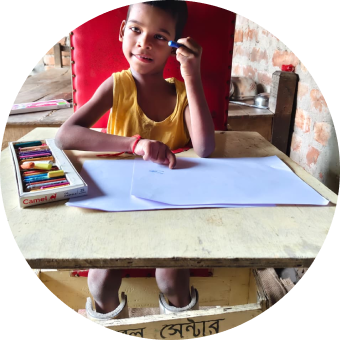
Sarthak, a young boy with cerebral palsy, faced daily challenges due to poor neck control and the inability to sit upright. Simple activities like eating or writing were exhausting for him. Everything changed when he received a specially modified chair designed to support his posture. With proper stability and comfort, Sarthak can now sit upright, eat independently, and able to perform pre-writing exercise. His cheerful smile reflects his growing confidence. His parents are overjoyed to witness his newfound independence and active participation in daily life. The chair has not only improved his physical abilities but also brought a positive spark to his journey.
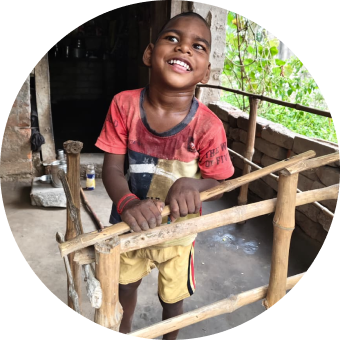
A child with intellectual disability, often experienced frequent epileptic seizures that disrupted his daily life and slowed his physical development. His parent has left him because of his disability; therefore he is being raised by his grandparent. Simple activities like standing, playing, or learning were interrupted by sudden episodes of epilepsy, leaving his grandparents worried and helpless. After starting a thorough medical intervention by GBCD, the seizures gradually stopped. With his health stabilized, Rocky began to engage more in physical activities, his movements grew stronger, and his coordination improved. His grandparents noticed remarkable changes—he could walk now, focus better, and enjoy life with fewer limitations.
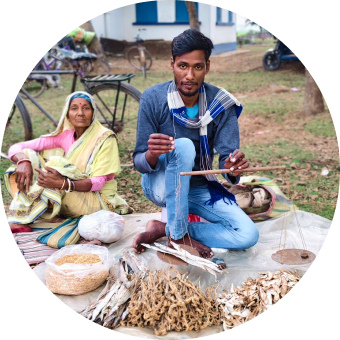
A 27-year-old from Sikhira village, developed a severe neurological disorder during his school years, leading to mental illness and violent behavior, which devastated his family both emotionally and financially. GBCD identified him and began providing consistent treatment, counseling, and essential support. With time and care, Amaresh has regained stability, started a small fish business with his mother, and now contributes responsibly to his family, with hopes of future employment
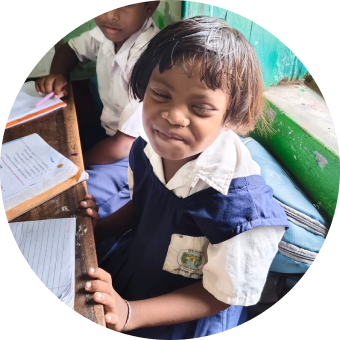
Eight-year-old Soumi Soren, a girl with Down syndrome from a tribal community where neither disability nor education is often prioritized, has shown remarkable progress. Through GBCD’s School Readiness Programme, she received training in Activities of Daily Living (ADL), toilet use, and pre-writing and pre-reading skills. Today, she is in Class III at Satidaha Primary School, attending regularly, completing small tasks assigned by teachers, and displaying improved social behavior. Academically, she understands basic number concepts, can imitate writing, and state her name and address. GBCD also organized school programme to ensure peer support, enabling Soumi to enjoy a friendly, inclusive environment both inside and outside school.
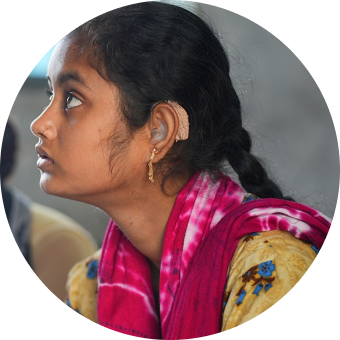
Nineteen-year-old Subhashree Maity, a student of Jadavpur High School, secured the first position in her school in the Higher Secondary Exam 2025. Subhashree’s journey with GBCD began in 2015, when she was just nine years old. At that time, she had distorted speech and very limited language and numerical skills for her age. GBCD intervened with Home-Based Support, arrangement of appropriate hearing aids, and regular speech therapy. From Class IX, she received subject-based coaching with deaf-friendly teaching methods and learning materials. To ensure an inclusive environment, GBCD also conducted school programs on Indian Sign Language, classroom demonstrations, and disability awareness for teachers and peers. These initiatives built strong support systems around her. Presently, Subhashree is pursuing a degree course, aiming higher education.
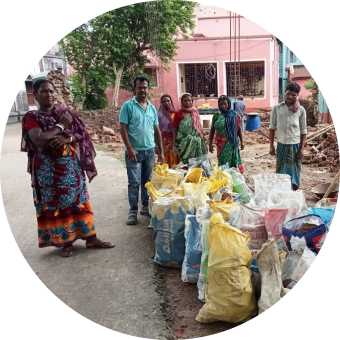
Persons with disabilities and their parents struggled to reach to Dhaniakhali Block Level Resource Center from the main road due to a muddy, uneven path that became impassable during rains. The Stretch was about 50-60 meters. The situation was so challenging that some parents even slipped and fell while carrying their children with disabilities to the centre for therapy sessions. The parents’ group Ashar Alo, formed to support children with disabilities, took the initiative to improve accessibility in their area. They first approached the panchayat to request the construction of a concrete road. However, as the official process was taking longer, they decided to act immediately. Using the map provided by panchayat officials, the group collected materials and jointly built a kachha road. This newly constructed path created a smooth, safe, and accessible entrance for everyone, especially wheelchair users and those with mobility challenges.
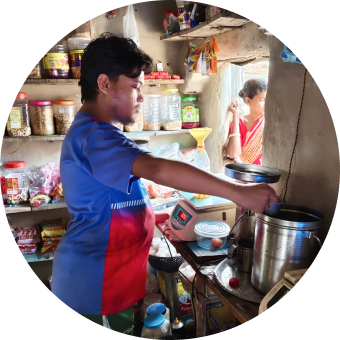
Twenty Five years old, Tufan, a person with a locomotor disability, once depended entirely on his family for support. Limited mobility kept him confined at home. GBCD provided five-step counseling to Tufan and his family, offered him entrepreneurship training, and encouraged his parents to believe in his abilities and support him in starting a small shop. At first, many doubted his ability to run a shop independently. But Tufan’s honesty, dedication, and welcoming nature soon turned his small shop into a busy gathering place. Villagers began appreciating the convenience, and his steady income brought dignity and financial security to his family. Today, Tufan is known as a successful shopkeeper. His journey shows how opportunity and support can help persons with disabilities move from dependency to self-reliance, becoming part of the social and economic mainstream.
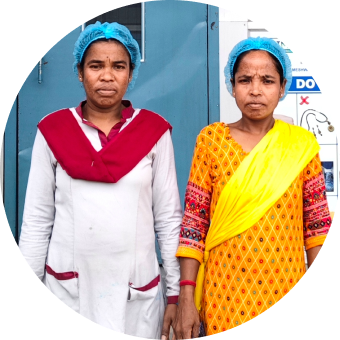
Sujata and Sulata Manki, 43-year-old hearing-impaired twin sisters from Garolmuri village, Hooghly, grew up in extreme poverty. Undiagnosed for years, they lived in silence, surviving on wood collection and often going hungry. Their lives changed in 2019 when GBCD identified them during a community survey. GBCD supported them with functional literacy training, and inclusion in monthly Deaf youth meetings, which helped build confidence and reduce isolation. They were also linked to government welfare schemes like the Manobik Pension. With enhanced skills and self-esteem, GBCD placed them in Lead Liquor Pvt. Ltd. in 2022, where they now earn an average monthly income of Rs. 25,000. Today, the sisters are financially secure, even saving money and building their own house. Their transformation from hardship to dignity is a testament to resilience and GBCD’s effective support.